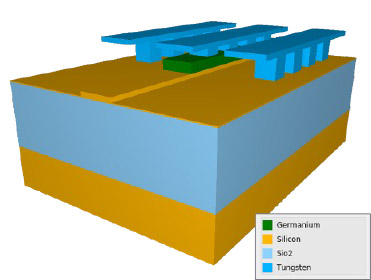
Learn How TCAD is a Key Enabler for Photodiode Development
February 23, 2023
In this webinar, Sungwon Kong will discuss these technologies and how TCAD can be broadly applied to multiple detector topology and material sets, thereby enabling multiple end-user markets.

Learn About Victory Visual, Silvaco’s New Graphical Visualization Solution for TCAD
September 22, 2022
In this webinar we will introduce Victory Visual, a new graphical post-processing tool for use with all Silvaco TCAD simulators and an integral part of the TCAD Victory interactive tools suite.

Learn How Victory Atomistic TCAD Solution Can Help You Succeed at Prototyping Atomistic Nanoscale Devices
September 8, 2022
In this webinar, we present how ultra-scaled Field-Effect Transistor (FET) technology requires simulations at the atomic scale for designing the most advanced technological architectures at 5 nm node and below. We present in detail the Victory Atomistic solution for atomistic simulations.

Learn How to Efficiently Achieve Accurate Experimental Etch Profiles in FinFET and Memory Applications with Victory TCAD Solution
August 11, 2022
In this webinar, we present these geometric etch models in the context of FinFET and memory applications. We demonstrate techniques to realize fin shaping, non-ideal etch profiles (bowing, twisting), and self-aligned processes (multi-patterning).

Learn How Silvaco Flow Helps Designing and Simulating Pixel Arrays in Flat Panel Displays and Detectors
June 30, 2022
In this webinar, we highlight how leading display and detector companies exploit the capabilities of Silvaco tools for schematic and layout editing, very accurate field solver-based parasitic extraction required by modern TFT technology, back-annotation of parasitic RC elements into the netlist, and fast and accurate SPICE simulations of large arrays of pixels.

How to Use Victory Quantum Transport Models for Atomistic Device Performance Predictions
May 5, 2022
In this webinar, the latest incoherent scattering models of the quantum transport implementations are presented. They faithfully reproduce--without adjustable parameters--experimental observations of band gap narrowing and Urbach band tails in a sequence of III-V semiconductors and transition metal dichalcogenides.

Learn How mqSemi AG Developed 3D Power Devices Proof of Concept with Silvaco TCAD Simulations
March 24, 2022 | 10:00 am – 10:30 am (PDT)
In this Webinar, we will introduce mqSemi and the 3D TCAD models and simulation results while highlighting Silvaco`s powerful Victory Process and Device.

How Silvaco TCAD is at the Heart of Innovation in RF Devices
March 17, 2022 | 10:00 am – 10:30 am (PDT)
In this Webinar, Silvaco’s TCAD Victory Device simulation tool is used to model both small- and large-signal behavior of various types of silicon-based substrates.
 /wp-content/uploads/2019/11/silvaco-logo.png
0
0
Gigi Boss
/wp-content/uploads/2019/11/silvaco-logo.png
Gigi Boss2022-02-28 12:49:322022-05-24 08:46:01Silvaco Announces that Teledyne e2v Expands Adoption of its Victory TCAD Solution to Further Accelerate Development of CMOS Image Sensors
/wp-content/uploads/2019/11/silvaco-logo.png
0
0
Gigi Boss
/wp-content/uploads/2019/11/silvaco-logo.png
Gigi Boss2022-02-28 12:49:322022-05-24 08:46:01Silvaco Announces that Teledyne e2v Expands Adoption of its Victory TCAD Solution to Further Accelerate Development of CMOS Image Sensors
How to Use Device Simulation as a Tool for Understanding GaN HEMTs
February 24, 2022 | 10:00 am – 10:30 am (PST)
This webinar will illustrate through specific published examples of how TCAD device simulation of GaN based devices can be a powerful tool to help explain complex performance limiting device instabilities in both RF and power devices.
